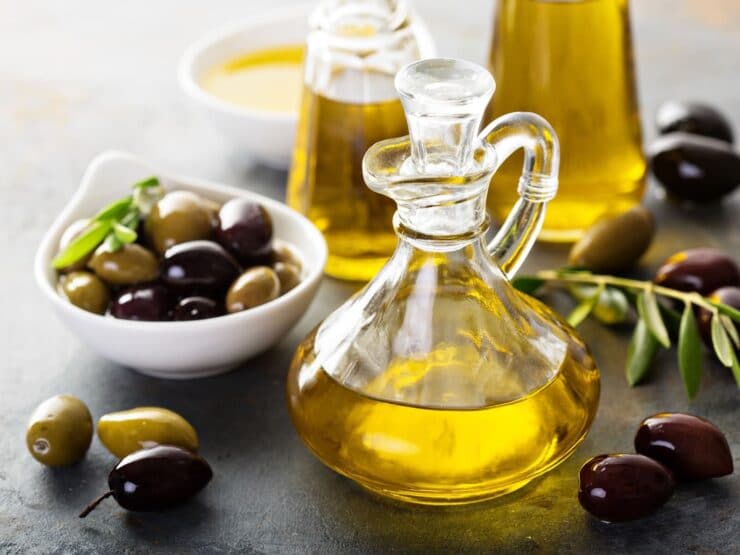This informative article about olive oil was written by our fabulous nutritionist, Lindsea Willon MS, NTP. Learn more about Lindsea here.
You can’t say “Mediterranean Diet” without thinking of olive oil. It is the hallmark ingredient of the diet, the region, and the cultures that live there. When you see the Mediterranean in your mind’s eye, you picture a hillside dotted with olive trees. When someone builds a Mediterranean-style home, they plant an olive tree in the courtyard. From hummus to bruschetta, Greek salad to tabbouleh, there is no Mediterranean cuisine without olive oil.

Why Olive Oil is Good For You
The Mediterranean diet is famous for its health benefits. It promises lower rates of heart disease and a lower risk for cancer. With how interlinked the diet is with its staple ingredient, it is little wonder that olive oil itself is responsible for many of these exact benefits.
First off, olive oil is very heart-healthy. Its secret? Polyphenols. Polyphenols are micronutrients found in plants and are present in olive oil in high concentrations. They have countless health benefits and research adds to the list of their advantages year after year. But their relation to heart health is long-established. Polyphenols have been shown to prevent the formation of artery-clogging plaques and have been proven to prevent the clots that cause heart attacks.
Olive oil is also cancer-protective, thanks to its high amounts of antioxidants. Think of oxidation as the process of breaking something down, especially when exposed to oxygen. When you cut an apple in two and leave half in the fridge for a day, that wilted skin, soggy edges, and brown tinge is from oxidation. The browning of the avocado you didn’t finish? Oxidation. The wilting of your lettuce? You guessed it, oxidation.
If you can see the effects of oxidation on produce in under 24 hours, imagine what it can do to your body over the course of years. At its best, oxidative damage is responsible for aging. At its worst, it can damage your DNA and lead to cancer. Enter antioxidants like those found in olive oil. These are plant chemicals that help prevent the exact damage described above. Because olive oil is so rich in antioxidants, it provides protection against oxidation and therefore protects against cancer.
What to Look For At The Grocery Store
Unfortunately, not all olive oil is created equal. In order to maximize the heart-healthy polyphenol content of the oil, it must be the freshest and highest quality possible. Here is what to look for on a label to ensure you are maximizing the health benefits:
- First Cold Press – Traditionally, olive oil was made by using a stone mill to press the oil out of the olives. Today, producers can use heat (which damages the oil) or chemicals (which never fully leave the oil) to extract more oil. In order to ensure you are getting olive oil that hasn’t been damaged by heat or adulterated with chemicals, you need to buy “first cold press” olive oil. This designation guarantees the oil was extracted using only mechanical means, like the traditional makers did for centuries.
- Extra Virgin – Polyphenols can break down over time, so extracting olive oil from the freshest olives leads to the highest polyphenol content. “Extra Virgin” on a label guarantees the olive oil was produced within 24 hours of the harvesting of the olives.
- Unfiltered – For the highest polyphenol content, choose the cloudier, unfiltered olive oil. Filtration removes remaining fruit particles, which further contribute to the overall polyphenol content. *Caveat – if you don’t plan to use your olive oil quickly, stick with filtered (clearer) olive oil, since the fruit particles can end up fermenting and detracting from the polyphenol content if left in the bottle too long.
Fun fact: Olive oil makers are very proud if a spoonful of their olive oil makes you cough. This was the traditional test of polyphenol content, used long before science confirmed what they knew to be true and before we had to rely on labels to ensure quality.
How to Best Use Olive Oil
Now that you’ve spent the time and money to buy the highest quality olive oil, it’s up to you to preserve its antioxidant content.
Do not bring home your unfiltered, first cold press, extra virgin olive oil and put it on your counter next to your stove.
Both light and heat can rob your olive oil of its antioxidant content, robbing you of your health benefits. It is best to buy olive oil in a dark bottle and store it in the cupboard. Preferably, a cupboard on the opposite side of the kitchen from your oven, so it isn’t exposed to heat as often as you are cooking. And yes, this also means that you should not cook with this high-quality olive oil.
This high-quality oil is best used in dressings or drizzled on your dish after cooking to preserve the antioxidants.
If you plan to cook with your olive oil, still purchase extra virgin, but don’t spend the extra money on the “first cold press” since you’ll be heating it anyway.
Olive oil is not just a staple of Mediterranean cuisine, it’s a key component to the health benefits the Mediterranean diet is so famous for. To maximize its impact, staying true to tradition is key. Buying unfiltered, first cold press, extra virgin olive oil and keeping it away from light and heat will allow your olive oil to provide the most protection against heart disease and cancer. Enjoy!
Research Sources:
Potential Health Benefits of Olive Oil and Plant Polyphenols
Leave a Reply